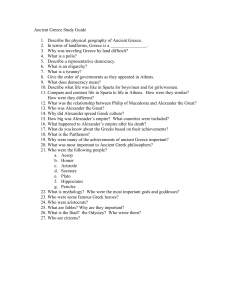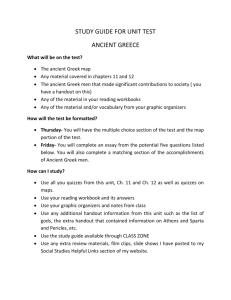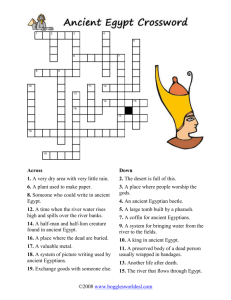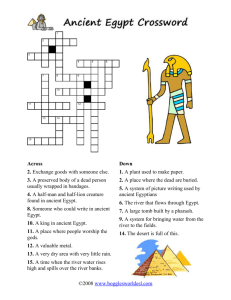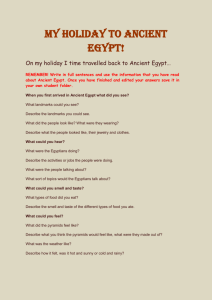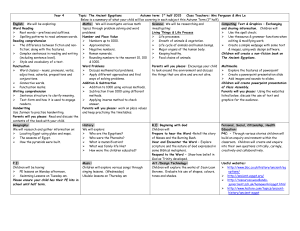III. Questions 8% (2%@) - Kwun Tong Government Secondary School
advertisement
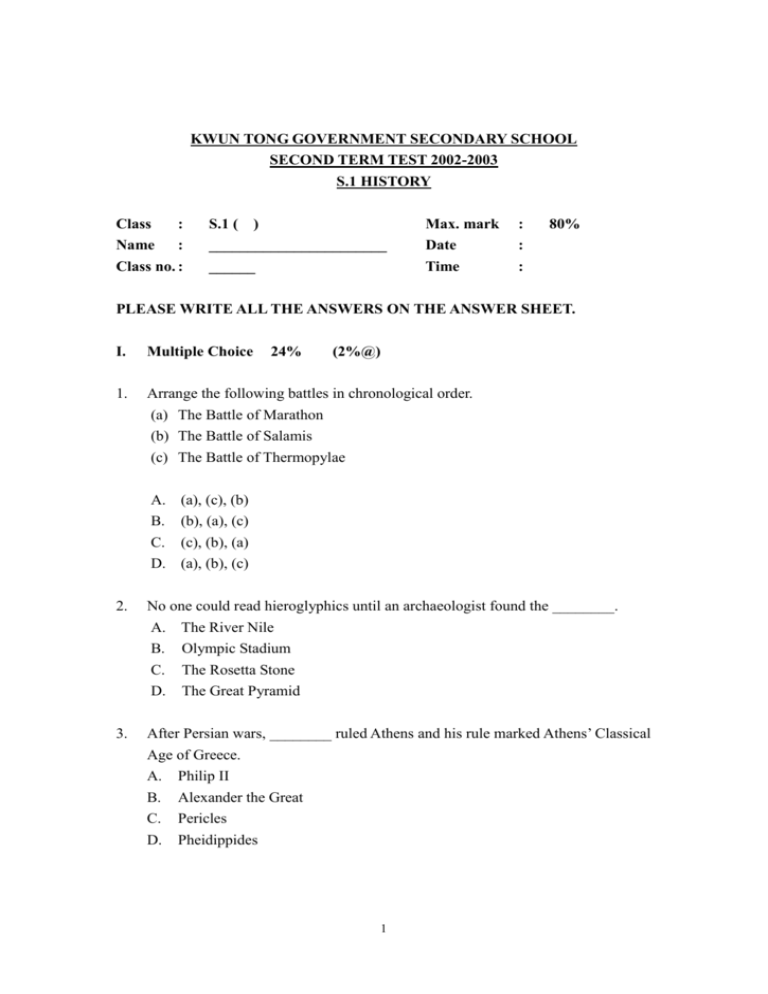
KWUN TONG GOVERNMENT SECONDARY SCHOOL SECOND TERM TEST 2002-2003 S.1 HISTORY Class : Name : Class no. : S.1 ( ) _______________________ ______ Max. mark Date Time : : : 80% PLEASE WRITE ALL THE ANSWERS ON THE ANSWER SHEET. I. Multiple Choice 24% (2%@) 1. Arrange the following battles in chronological order. (a) The Battle of Marathon (b) The Battle of Salamis (c) The Battle of Thermopylae A. (a), (c), (b) B. (b), (a), (c) C. (c), (b), (a) D. (a), (b), (c) 2. No one could read hieroglyphics until an archaeologist found the ________. A. The River Nile B. Olympic Stadium C. The Rosetta Stone D. The Great Pyramid 3. After Persian wars, ________ ruled Athens and his rule marked Athens’ Classical Age of Greece. A. Philip II B. Alexander the Great C. Pericles D. Pheidippides 1 4. Which of the following groups shows the highest and the lowest class in ancient Egyptian society? A. the pharaoh and farmers B. priests and slaves C. the pharaoh and slaves D. priests and craftsmen 5. Alexander the Great came from ________ and later he became the king of Greece. A. Athens 6. 8. D. Macedonia the water clock the calendar the sundial the plough The Athens over ________ could vote. A. 17 B. 18 C. 21 D. 22 Which of the following were conquered by Alexander the Great in 334-323 BC? (1) Asia Minor (2) Egypt (3) Persia A. B. C. D. 9. C. Salamis All the Egyptian inventions below were used to tell the time except A. B. C. D. 7. B. Sparta (1) and (2) only (1) and (3) only (2) and (3) only (1), (2), and (3) The ancient Olympic Games were held every ________ years. A. 2 B. 3 C. 4 D. 5 10. Alexander the Great died in ________ at the age of 33 in 323 BC. A. India B. Egypt C. Persia D. Babylon 2 11. The Great Sphinx was a stone statue with (1) a man’s body (2) a lion’s body A. B. C. D. (3) a man’s face (1) and (2) only (1) and (3) only (2) and (3) only (1), (2) and (3) 12. In 146 BC, ancient Greece was conquered by the _______ that ended the Greek civilization. A. Persians B. Egyptians C. Romans D. Assyrians II. Fill in the blanks 20% (2%@) 1. 2. 3. 4. 5. ________ are Pharaohs’ tombs. The first modern Olympic Game was held in ________ in 1896. The ancient Egyptians made preserved dead bodies called _______. Sparta was ruled by ________ who loved wars. When Alexander conquered Egypt, he built the city of ________ that helped to spread the Greek culture. 6. The ancient Egyptians invented the ________ to raise water and irrigate crops. 7. The winner of the ancient Olympic Game was given a ________ of olive leaves. 8. In the Battle of Marathon, Athens asked ________ for help but being rejected. 9. Athens had the form of government called ________ since they held an assembly to decide the ways to rule themselves. 10. Ancient Egyptians first took out the ________ of a dead body in order to preserve it. III. Questions 8% (2%@) Answer the following questions in COMPLETE SENTENCES. 1. 2. 3. 4. Why did Alexander the Great turn for home in India? Why did the ancient Egyptians preserve dead bodies? Why there were many famous thinkers and scientists in Athens? Why do people call Alexander “the Great”? 3 IV. Right or Wrong 12% (2%@) In the table on the answer sheet, put a “” if the sentence is RIGHT. Put an “╳”if the sentence is WRONG, and then rewrite the word or phrase in italics to make it correct. 1. 2. 3. The Nile Valley is in northeast Africa. Ancient Egyptians used wood to make ships. The signs used in hieroglyphics, such as birds or baskets, stood only for sounds, 4. 5. but not for words or their meanings. Sparta defeated the Persians in the Battle of Marathon. The Olympic Games were first held in Athens in 776 BC. 6. Ancient Egyptians put some sugar and wine inside the dead body in order to stop it from decaying. V. Data-based Questions 16% Answer the following questions according to the sources given. Question 1 is based on the picture below. 1 8% (a) What was the man doing? 2% (b) What did he use to do his job? 2% (c) Which of these persons living in ancient Egypt—a farmer, a priest, a craftsman—would find the thing made by the man more useful? Explain your answer. 4% 4 Question 2 is based on the short passage below. A special kind of city grew up in ancient Greek times. Each of these cities had its own army, ruler and government. Each was like an independent state. 2. (a) What NAME do we use for the ancient Greek states referred to in the passage? 2% Explain your answer using the words of the passage. 4% (b) Why did these kind of states develop in ancient Greek times? 2% END OF PAPER 5

